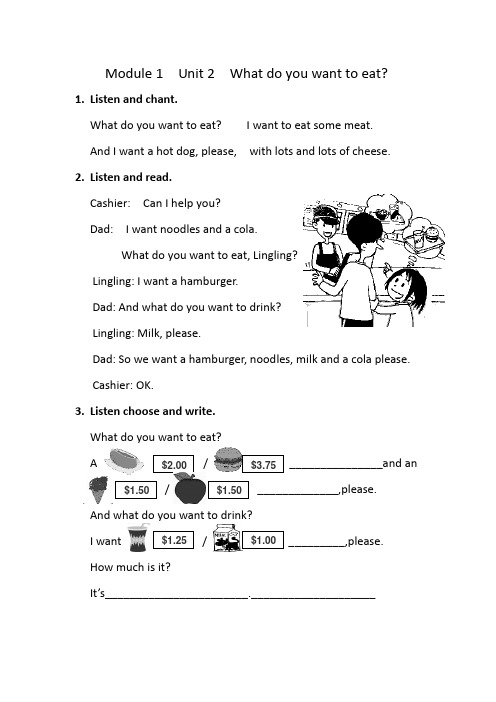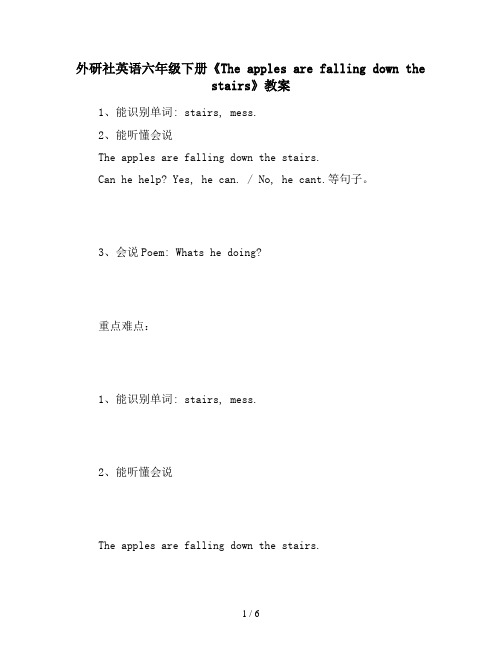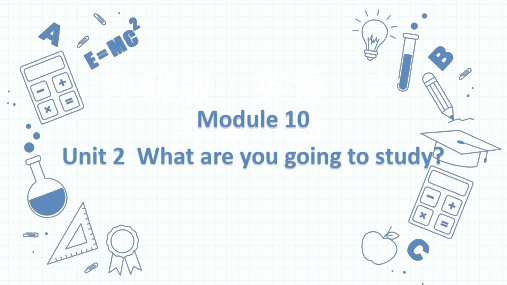外研社六年级英语下册Module_2_Unit_2
- 格式:ppt
- 大小:740.50 KB
- 文档页数:9

Module 1 Unit 2 What do you want to eat?1. Listen and chant.What do you want to eat? I want to eat some meat. And I want a hot dog, please, with lots and lots of cheese.2. Listen and read.Cashier: Can I help you?Dad: I want noodles and a cola.What do you want to eat, Lingling?Lingling: I want a hamburger.Dad: And what do you want to drink?Lingling: Milk, please.Dad: So we want a hamburger, noodles, milk and a cola please. Cashier: OK.3. Listen choose and write.What do you want to eat?A/_______________and an / _____________,please. And what do you want to drink?I want / _________,please.How much is it?It ’s_______________________.____________________$2.004.Listen and say. Then sing.What do you want to eat? Soup, noodles or fish?Come in and have a seatand have your favourite dish.What do you want to drink?Milk, juice, or tea?All our food is very ,very nice, as you can see.5.Follow and say.6.Do and say.Make a restaurant menu and role-play with your friend.A:What do you want to eat?B:I want chicken ad rice, please.A:What do you want to drink?B:I want a cola, please.。

外研社英语六年级下册《The apples are falling down thestairs》教案1、能识别单词: stairs, mess.2、能听懂会说The apples are falling down the stairs.Can he help? Yes, he can. / No, he cant.等句子。
3、会说Poem: Whats he doing?重点难点:1、能识别单词: stairs, mess.2、能听懂会说The apples are falling down the stairs.Can he help? Yes, he can. / No, he cant.等句子。
3、会说Poem: Whats he doing?教学过程:Step 1:Warm-up and show the learning aims.1、Act out the dialogue of unit1.2、T: Wonderful ! Boys and girls, today we are going to learn Module 4 Unit2 The apples are falling down the stairs. (板书课题) First, please look at our learning aims.(出示本课学习目标,教师慢慢读,学生仔细看、认真听。
) Step 2:Learn the new words and the key sentences.1、Play the tape ,have the students look at Activity 1 of Page 16 and underline the new words and the key sentences.2、Write the new words and the key sentences in the blackboard, ask the students to try to read and explain.3、Let the students remember the words in 2 minutes.Step 3: Learn the Text1、Show the pictures of Activity 2 on the blackboard.2、Play the tape,ask the students to listen and match:Who can help the girl?3、Work in pairs: Point to the pictures and say.For example:A: Can he help?B: Yes, he can. He will pick up the apples.4、Learn the poem: Listen and say, then say the poem.5、Play the game: What is he doing?Step 4: Finish a taskDescribe the pictures:What is she doing? She isWhat is he doing? He is(请学生依次观察两幅图片,进行描述,然后写到作业上)板书设计:Module 4Unit 2 The apples are falling down the stairs.stairs messThe apples are falling down the stairs. Can he help?Yes, he can. / No, he cant. Whats he doing?。


外研版小学英语六年级下册课文翻译HEN system office room 【HEN16H-HENS2AHENS8Q8-HENH1688】M o d u l e1u n i t1part1我想要一个汉堡包。
我想要一个热狗。
噢,“热”狗来了。
part2大明,你想要什么?我不知道。
热狗是什么它真的是一条狗吗不是的,大明。
那就是热狗。
它看起来不错!look的三单形式looks你们要点儿什么?我想要一个热狗。
want+某物,表示想要某物.我想要一个汉堡包。
我也要一个汉堡包。
喝的呢?我也要一杯可乐。
请来三杯可乐。
three colas 三杯可乐那就是两个汉堡包、一个热狗和三杯可乐。
多少钱?how much 在此表示多少钱,用来询问物品价格,后面跟is还是are,要根据梭巡物品的数的不同来确定。
(总共)十三美元二十五美分。
给你。
谢谢。
用餐愉快!enjoy意味享用和享受,他后面可以加表示三餐类的名词,表示享用某顿饭。
我来拿它们吧。
当心!噢不!对不起!噢不!我的新短裤和新鞋!unit2part1你想要吃什么?我想吃些肉。
some意为“一些”,用来表示不确切的数量,既可以修饰可数名词复数,也可以修饰不可数名词。
我想要一个热狗,带很多很多的奶酪。
part2您要点儿什么?我想要面条和一杯可乐。
你想吃什么,玲玲?我想要一个汉堡包。
你想喝什么?牛奶。
那么我们要一个汉堡包、面条、牛奶和一杯可乐。
好的。
Module2 unit1part1我要起床吃早餐。
get up起床 have breakfast 吃早餐早餐?11点半了。
你要吃午餐了!part2我们今天在公园里野餐吧!好哇!···后来···我很饿。
我们什么时候吃饭,妈妈?When既可以对事情发生的具体时间提问,也可对大体时间提问。
12点半。
现在几点了?才11点半。
还有一个小时!看,池塘里有一些鸭子。
to go剩余它们很可爱。

六年级下册英语外研版一起Module2 模块测试卷一、单词辨音。
找出下列单词中画线部分读音不同的单词,将序号写在前面括号内。
( ) 1. A. hand B. later C. map D. planD. watch B. chair C. teacher ( ) 2. A. schoolD. dark B. far ( ) 3. A. car C. warmD. dry ( ) 4. A. happy B. any C. hurryD. cousinC. cloud B. mouth ) 5. A. shout (二、单项填空。
从A. B. C三个选项中选出可以填人空白处的最佳选项。
( ) 1. —Where are you going?—I'm going to ________ Xinghai Park.A. aB. theC. /( ) 2. They ________ hungry and angry ________ the monkeys.A. were; withB. are; ofC. was; with( ) 3. Then those naughty ducks went to our picnic and ________ all the sandwiches.A. haveB. hadC. has( ) 4. Now look at this photo. They ________.A. were eatB. was ateC. are eating( ) 5. In Shanghai it's going to be ________.A. rainingB. rainC. rainy三、完成句子。
用括号内所给词的正确形式填空。
1. I have got some books. I read ________ (they) every day.2. My father ________ (send) me an email yesterday.3. It is very cold these days. It ________ (snow) soon.4. She likes ________ (skate) in winter.5. What ________ (be) the date the day before yesterday?四、改写句子。

【外研版】六年级英语下册(一年级起点)课文翻译一、教材目录Module 1Unit 1 I want a hot dog,please.Unit 2 What do you want to eat?Module 2Unit 1 When are we going to eat?Unit 2 It will rain in Beijing.Module 3Unit 1 I took some photos.Unit 2 The sun is shining.Module 4Unit 1 I can’t carry all these things.Unit 2 The apples are falling down the stairs!Module 5Unit 1 He is playing the suona,but the telephone rings. Unit 2 The name of the spaceship is Shenzhou V.Module 6Unit 1 It was Daming’s birthday yesterday.Unit 2 I haven’t got a book about the US.Module 7Unit 1 My father flew into space in Shenzhou V. Unit 2 She couldn’t see or hear.Module 8Unit 1 Why do you have cups on your heads?Unit 2 Why are you wearing a hat?Module 9Unit 1 Best wishes to you!Unit 2 Wishing you happiness every day.Module 10Unit 1 We’re going to different schools.Unit 2 I’m going to Lake Middle School.二、课文翻译Module 1Unit 1 I want a hot dog,please.Module 1 Unit 1 Listen,read and act out.英语课文翻译Cashier: Can I help you?收银员:我能为你们做点儿什么?Simon: What do you want,Daming?西蒙:你想要什么,大明?Daming: I don't know.What's a hot dog? Is it a...大明:我不知道。
外研社剑桥六年级下册英语课堂笔记Cambridge Primary English is a comprehensive and stimulating course designed for students in Grade 6. In this course, students will develop their language skills in a fun and interactive way. Here are some class notes from the Cambridge Primary English textbook published by Foreign Language Teaching and Research Press.Unit 1: My School LifeIn this unit, students will learn vocabulary related to school subjects, school facilities, and daily routines. They will practice using sentences to describe their school life. For example, "I have English class on Mondays and Fridays," or "I play basketball with my friends during lunch break."Unit 2: My Family and FriendsStudents will learn vocabulary related to family members, friends, and relationships. They will practice introducing their family members and friends using sentences like "This is my mom. She is a teacher," or "My best friend's name is Sarah. We like to hang out together."Unit 3: My HobbiesIn this unit, students will learn vocabulary related to hobbies and interests. They will practice using sentences to talk about their hobbies. For example, "I enjoy painting in my free time," or "I like playing the piano because it helps me relax."Unit 4: My CityStudents will learn vocabulary related to city life, landmarks, and transportation. They will practice using sentences to describe their city and places of interest. For example, "I live in a bustling city with many skyscrapers," or "The park is my favorite place to go for a walk."Unit 5: Healthy LivingIn this unit, students will learn vocabulary related to food, exercise, and healthy living habits. They will practice using sentences to talk about their diet and daily routines. For example, "I eat a balanced diet with lots of fruits and vegetables," or "I exercise for 30 minutes every day to stay fit."Unit 6: Our PlanetStudents will learn vocabulary related to environmental issues, recycling, and conservation. They will practice using sentences to talk about ways to protect the planet. For example,"We should recycle plastic bottles to reduce pollution," or "Planting trees is a great way to help combat climate change."Overall, the Cambridge Primary English course for Grade 6 covers a wide range of topics and provides students with the language skills they need to communicate effectively in English. The lessons are engaging and interactive, making learning fun and enjoyable for students. By the end of the course, students will have developed their vocabulary, grammar, and speaking skills, preparing them for further studies in English.。
外研版六年级下册英语第二单元教材分析
Module 2
本课时是外研版三起点六年级上册第二模块第二单元主要为大家讲解、复习表示天气的单词,要求学生会用英语来描述某地未来的天气情况。
并通过一系列的课堂活动,创造语境,让学生把单词运用于句子中,学会用It will结构描述未来天气,并根据不同天气安排不同活动。
本课时贴近学生生活,能够很好的激发学生的兴趣。
六年级的学生已经有一定的英语基础和一些学习方法,让学生进行语言交流与应用。
学会用已经学过的语法及单词写作文,以学生为主体,发展语言综合运用能力。
该部分通过活动、游戏学生能产生学习英语的兴趣;学生能敢于、乐于、善于开口讲英语,积极参与交流,树立学好英语的信心。
因此,在本课的设计中,比较充分地运用了新课程标准的教育教学理念,采用了多媒体课件,考虑了新课标下的学生特点,强调了学生共同合作,参与学习过程。
用一般将来时的It will 结构来表达未来的天气,所以我把这节课的重点放在了用It will 结构来表达未来的天气的句型上。
六年级学生具备一定的英语基础,而对于单词也已经有了掌握,能够读和书写。
单元教学目标
1. 知识目标
(1)新单词later,go to,duck pond,cloud,dry,like ,look like,ter,go to,duck pond,cloud,dry,like ,look like,stay.,snow,。
外研社(一起点)六年级下册Module1-Module10课前知识预习一、词汇hot dog 热狗cashier 收银员cola 可乐;一杯可乐soup 汤dollar 美元cent 美分enjoy 享用,享受meal 餐二、句子1. I want a hamburger. 我想要一个汉堡。
2.—What do you want? 你想要什么?—I want a hot dog. 我想要一个热狗。
3. Can I have some soup? 我可以要一些粥吗?4.—How much is it? 多少钱?—It’s thirteen dollars and twenty-five cents. 一共是13美元,25美分。
5. Here’s your food. 这是你的食物。
6.—What do you want to eat? 你想吃什么?—I want to eat some meat. 我想吃些肉。
7. Can I help you? 我可以帮你吗?8.—What do you want to drink? 你想喝什么?—Milk, please. 请来一杯牛奶。
三、句型结构1. I want + a/ an/ some... + 名词. 表示某人想要某物。
eg: I want some eggs. 我想要一些鸡蛋。
2. What do you want to eat/ drink? 询问对方想吃/ 喝什么。
eg: —What do you want to drink? 你想喝点什么?—A cup of coffee, please. 请来一杯咖啡。
3. —How much is ...? 询问某物多少钱。
—It’s ...eg: —How much is the coat? 这个外套多少钱?—It’s one hundred yuan. 一百元。
一、词汇later 后来,以后to go 剩余dark 黑色的;黑暗的cloud 云Oh dear! 哎呀!天哪!dry 干的stay 保持,维持cloudy 多云的二、句子1. —When are we going to eat, Mum? 我们什么时候吃东西,妈妈?—At half past twelve. 十二点半。
外研社剑桥六年级下册英语课堂笔记全文共3篇示例,供读者参考篇1Here are some classroom notes on the Foreign Research Society Cambridge English Course for Grade 6 (Volume 2), written from a student's perspective with a length of around 2,000 words:Cambridge English Course - Grade 6, Volume 2 Class NotesUnit 1: Incredible AnimalsLearned tons of cool animal facts like how penguins huddle together to stay warm and that bees communicate through dancing!Mrs. Thompson had us work in groups to research weird animal abilities and present to the class. My group did the mantis shrimp which has one of the strongest punches in the animal kingdom.New vocabulary: huddle, colony, incredible, ability, species. Mrs. T made us use the new words in example sentences.Unit 2: Mysteries of the PastThis unit was all about ancient civilizations like the Mayans, Egyptians, and Romans. Such fascinating stuff!Learned about hieroglyphics and tried writing our names using those crazy ancient Egyptian symbols. Harder than it looks!For our project, we had to create a museum exhibit about an ancient artifact or monument. I did mine on Stonehenge. Still not sure how those massive stones got there.New words: civilization, archaeologist, excavate, monument, artifactUnit 3: Going GreenAll about environmental protection and sustainability. Kind of heavy topics but important to learn about.Talked about things like renewable energy sources, recycling, deforestation, and carbon footprints. I didn't realize how much impact humans have on the planet.For our activity, we calculated our family's carbon footprints and came up with ways to reduce them. My family definitely needs to cut down on electricity usage.New vocabulary: sustainability, renewable, deforestation, carbon footprint, greenhouse gasesUnit 4: Exploring MusicThis was a fun one - we got to learn about different genres of music from around the world like reggae, K-pop, and Indian classical music.Watched clips of traditional dances and instruments which was really cool to see. That digeridoo thing from Australia was wild!Our group project was to create a musical performance blending styles from different cultures. We did a K-pop/rock fusion number - it was awesome!New words: genre, lyrics, vocals, rhythm, fusionUnit 5: Entertainment EvolutionThis unit covered how entertainment has changed over time, from ancient Greek plays to modern movies and video games.Talked about special effects in movies and how the technology has advanced. Those Lord of the Rings battle scenes were revolutionary for their time!My favorite part was getting into groups and putting on short skits or plays using props and costumes from the classroom supplies.New vocab: evolve, cinerama, animation, props, costumesUnit 6: Secrets of the MindLearned all about the human brain, how it works, and things like memory, concentration, and problem-solving.Did you know we only use a small percentage of our brain's true potential? So much about it is still a mystery.For our final project, we had to design an experiment to test some aspect of the brain like memory retention or multitasking ability. It was really interesting!New words: cognitive, retain, multitasking, psychology, neuroscienceOverall, this was a jam-packed semester full of cool topics! Sometimes the workload felt a bit heavy, but the units were very engaging. Learned a ton and definitely feel much more prepared for secondary school English after this class. Shoutout to the awesome Mrs. Thompson for making it all so fun!篇2Here are classroom notes for a Cambridge English course at the 6th grade level, written from a student's perspective, around 2000 words:Cambridge English Classroom Notes - Grade 6, Volume 2Class 1: IntroductionsThe teacher Ms. Roberts welcomed us back after the winter break. She seems really nice!We went over the course outline and materials - the Cambridge English textbook, workbooks, reading supplements.For the first unit, we'll be learning about holidays and travel. Looks fun!Class 2: Unit 1 - Holiday PlansPracticed asking/answering questions about holiday plans using "going to" future tense.New vocabulary: destination, sightseeing, souvenir, accommodation, travel guide.Did some role-plays in pairs about planning an imaginary trip.Class 3: Holiday StoriesRead a story about a family's disastrous holiday - their hotel was overbooked!Learned using past tenses to describe experiences and narrate stories.Wrote our own short vacation stories and shared them. Sarah's was hilarious!Class 4: Comparatives and SuperlativesLearned how to form and use comparative (-er) and superlative (-est) adjectives.E.g. Asia is larger than Europe. Russia is the largest country in the world.Practiced with ordering travel destinations from cheapest to most expensive.Class 5: Language SkillsListening comprehension about holiday packages and activities.Worked on skimming/scanning skills by finding key information in travel texts.Learned handy travel phrases like "How do I get to...?" and "Can I have the bill please?"Class 6: Project WorkPut into groups to research and plan an imaginary 2-week holiday.Have to decide destination, itinerary, budget, activities etc.Will present our travel plans to the class next week. Ours is Thailand!Class 7: Holiday PresentationsEach group gave a presentation on their planned holiday. We had to speak clearly and use visuals.Some were super creative like Sarah's group who did a skit!Got feedback from Ms. Roberts on fluency, vocabulary use and grammar accuracy.Class 8: Unit TestHad a written test on the unit's skills and language.Grammar section was ok, reading comprehension was tough though.Feeling relieved it's over! Looking forward to starting the next unit.Class 9: Unit 2 - EntertainmentNew unit is all about different types of entertainment - books, movies, sports etc.Learned adjectives to describe opinions like "fascinating", "dull", "gripping".Talked about our favourite books, movies, sports and why we enjoy them.Class 10: Movie ProjectTask is to promote an upcoming movie we'd recommend, working in pairs.Have to include a pitch, review, poster and trailer.My partner Jack and I chose to promote the new Marvel movie.Class 11: Sentence StructureLearned about using different types of clauses to add details and formulate complex sentences.Main clauses, relative clauses, adverbial clauses etc. Still finding it tricky!Did an exercise identifying and combining different clause types.Class 12: Debate SkillsLearned how to structure arguments, agree/disagree and clarify points.Useful phrases like "I totally disagree because...", "Could you clarify what you meant by...?"We debated whether reading books is better than watching movies. I was on the book side!Class 13: Literature StudyStarted reading the class novel - Treasure Island by Robert Louis Stevenson.Discussed the plot, characters and themes so far. It's a thrilling adventure story!Learned about narrative techniques like foreshadowing and cliff-hangers.Class 14: Book PresentationsWe each had to give a short talk about a book we've read recently.I presented on Harry Potter and the Prisoner of Azkaban. Tried to summarize the story without giving away spoilers!After, we voted for the book we most wanted to read next as a class.Class 15: Portfolio WorkStarted putting together our language portfolios for the semester.Have to include samples of our writing, a self-assessment and evidence of progress.The portfolios will be graded along with our other work.Class 16: Review & ReflectionsToday we reviewed the key language points from both units this semester.Also set some goals for continued English practice over the summer.Overall, I've really enjoyed this class and feel more confident with my English skills now!篇3Here are some classroom notes from a 6th grade student studying English using the Cambridge English course fromForeign Language Teaching and Research Press (外研社剑桥六年级下册英语课堂笔记):Unit 1: My Colourful WorldNew vocabulary: primary colours (red, yellow, blue), secondary colours (green, orange, purple), shades, tints, dyes, pigmentsLearned about how colours are made by mixing pigments or dyesDiscussed our favorite colours and why we like themRead a story about a little girl who loved bright, vibrant coloursMade colour wheels showing primary and secondary colour combinationsUnit 2: Animal SensesNew words: sight, hearing, smell, taste, touch, senses, detect, stimuliLearned about the 5 main senses and how animals use them to surviveRead facts about animals with exceptional senses like eagles, sharks, dogsHad a quiz matching animals to their strongest senseDid an experiment testing our own senses by identifying smells, tastes, etc.Unit 3: Going GreenVocabulary: recycle, reuse, reduce, pollution, environmentally friendly, conservationDiscussed ways to protect the environment like recycling, saving energy/waterRead an article about a "zero waste" family that produces very little trashWatched a video about kids helping the environment through projectsMade posters encouraging green habits to put up around schoolUnit 4: ExplorationNew words: explore, expedition, geography, landforms, uncharted, navigateLearned about famous explorers like Marco Polo, Neil Armstrong, Jacques CousteauRead diary entries from explorers describing their journeys and discoveriesGave presentations on explorers we admire and why their work was importantMapped out a fictional exploration across an imaginary continentUnit 5: InventionsVocabulary: innovation, invention, create, design, patent, prototypeStudied important inventions that changed people's lives like the printing press, light bulbRead bios of famous inventors and the challenges they overcameHeld an "Invention Convention" where we presented original product ideasWrote steps for using or making an invention in groupsI'm really enjoying learning about so many interesting topics in English class this semester! Writing these notes helps me review and remember what we've covered.。